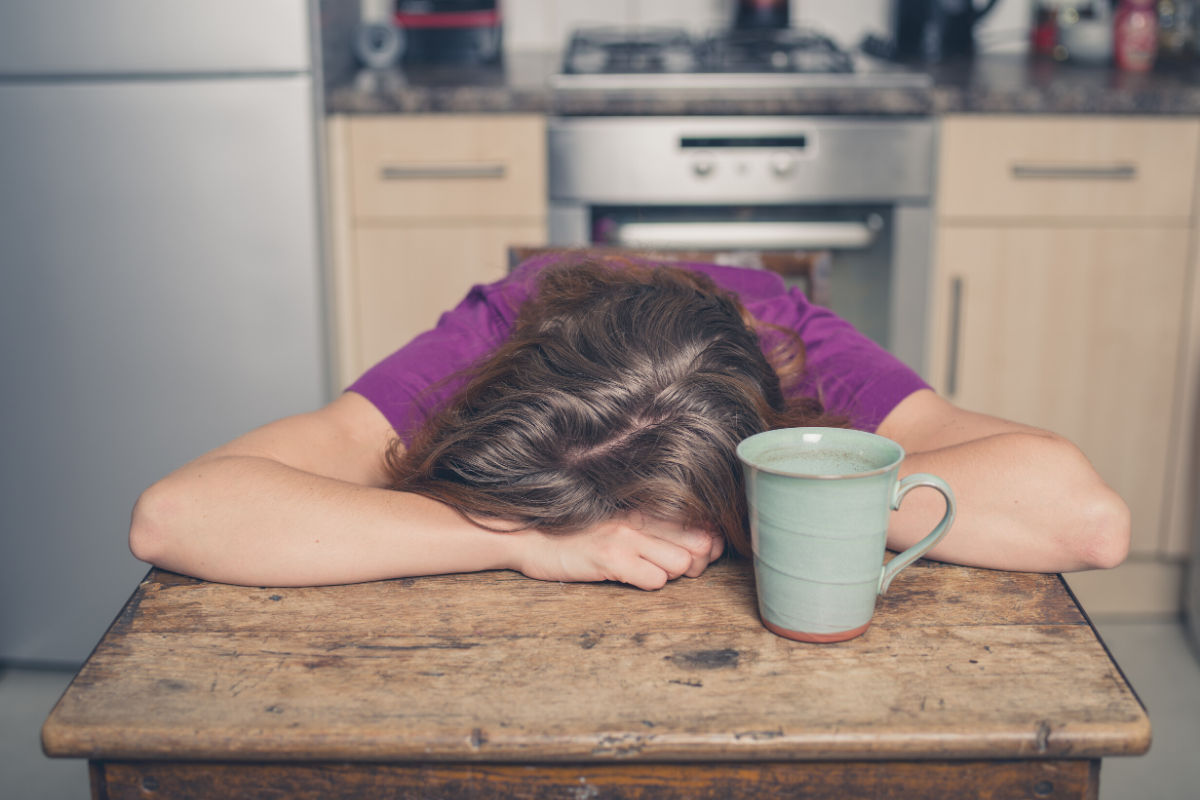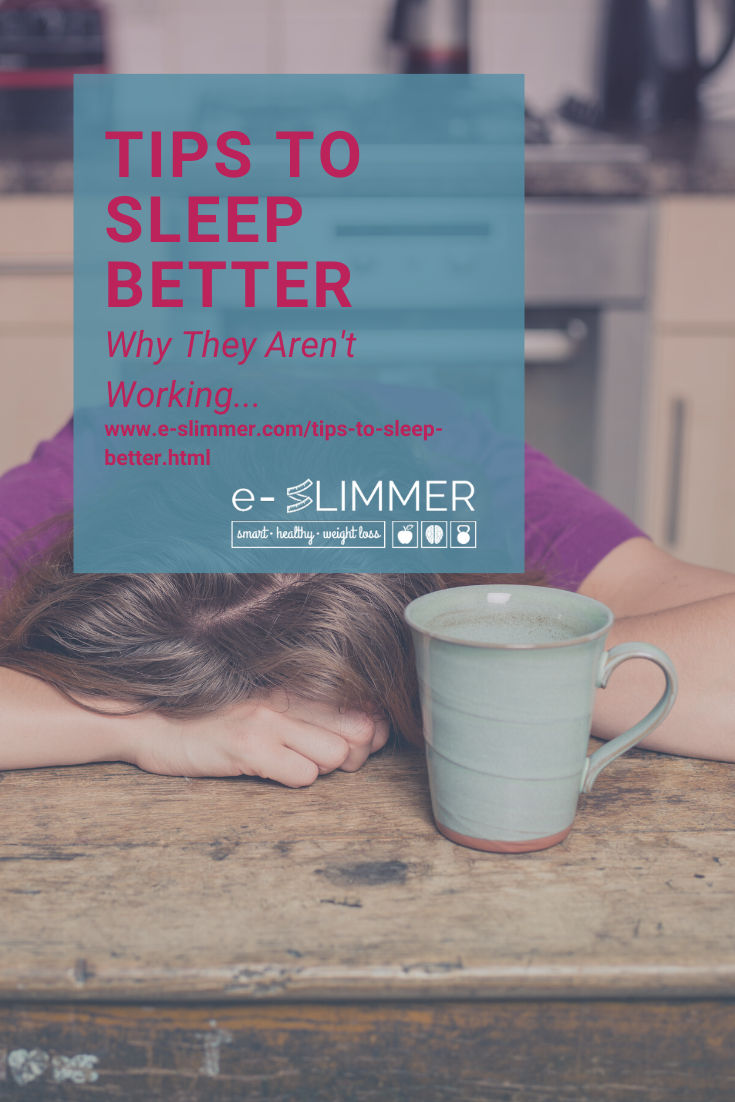Why Tips to Sleep Better Aren't Working for You.
And What to Do About It

Have you ever had a really bad night’s sleep?
I bet you have. Probably more than one.
So, I’m guessing you know how it feels the morning after. You can’t concentrate. You feel exhausted. You can barely keep your eyes open. And man, are you hungry.
You’re not really fit for much. Let alone the exercise, cooking and meal prepping you need to do as part of your weight loss plan.
If you’ve had more than one of these bad night’s sleep you’ve probably scoured the internet for tips to sleep better. Little pointers to help you drift off to the land of nod.
There are quite a few out there. I’m betting you’ve read them.
If they’ve worked, great. What are you doing here?
Go and check out these other great pages about exercise and healthy eating.
If they haven’t worked, you’re probably extremely frustrated, knackered, and maybe even feeling like a bit of a failure. I mean, sleep is the most natural thing in the world.
Why isn’t it happening for you?
Tips to Better Sleep: Why They Aren't Working
Everyone is different and what works for others, may not work for you. A lesson that was hammered home to me with one of my very first clients.
A typical higher flyer, with a high stress job. Never liking to sit still for too long. You know the type. You may be the type.
Fresh out of nutrition coaching school I was keen to show off my knowledge. Not just about nutrition, but about the impact of stress and lack of sleep on her goals and her health.
I threw everything at her. All the tips to sleep better I knew.
Getting to bed earlier and being asleep by 10. Not using any electrical equipment for an hour before bed. Having an hour’s wind down. A hot bath.
And bless her, she tried to comply.
Reading her feedback sheets, it was obvious her sleep had deteriorated. So, the tips and techniques kept coming.
After a couple of months, we met up and, she looked like crap.
What was going so wrong?
I hadn’t remembered the fundamental rule of being a coach…everyone is different.
She was getting to bed before 10, but she was just tossing and turning for hours, thinking about not being able to get to sleep. She knew how important sleep was, and it was worrying her that she couldn’t.
In truth, going to bed too early for her, before she was even tired, was causing her more stress.
Tips to Sleep Better: Learn from My Mistake
So, if you’ve tried umpteen tips to sleep better and they haven’t worked, don’t despair. Instead, notice what is happening when you can’t sleep.
Are you tossing and turning because you’re uncomfortable?
Are you disturbed by noise? A husband snoring? Music from a neighbour?
Are you having trouble shutting your mind down? Events of the day playing over and over again?
Whatever is stopping you get to sleep will be the key to the technique that will help you.
There are very good reasons why experts, and non-experts alike, tout tips of turning off telly’s, computers and iPads an hour before bed. They give off a blue light which tricks your brain into thinking it’s earlier than it is.
There are also very good reasons they suggest changing your mattress, making your room cooler, using blackout blinds, or ear plugs. But if those aren’t the reasons you can’t fall asleep, then they’re not going to help.
Personally, I find having the television on while I’m trying to get to sleep helps distract my mind enough for it to be able to switch off.
My client found that going to bed a bit later allowed her to drift off quicker and gave her more restful sleep.
Working out what keeps you up at night is the key to getting a good night sleep.
Tips to Sleep Better: What to Do?
So, let’s look at some reasons you might not be falling asleep and what might help:
1. Discomfort – Are you tossing and turning unable to get comfortable? Is this because you’re in pain? Is your mattress too hard or too soft? Whatever the reason for your discomfort, find a way to sort it out. Go see a chiropractor, an osteopath or get a sport massage. Most mattress shops offer a 60-90 day trial. Or, if you can’t afford a new mattress, try a topper.
2. Worry – Do you start to worry about debt, relationship problems or a work issue? Talk out your problems with friends, family, your loved one. A problem shared is a problem halved, as they say. If it’s a bit more serious, talk to a councillor. Having a third party to unload to can really help.
3. Mind racing – Does your mind switch on as soon as you try to switch off? Then find a distraction. A television programme you’ve already seen, I used to love Friends for this, having the radio on, or a noise machine. Reading a book can tire your mind out. Or, maybe, keeping a journal, writing down the events of the day, getting your stress and worries on paper.
4. Too tired – Are you so tired that your tiredness seems to be keeping you awake? It happens to toddlers and children quite a bit. But it does also happen to adults. The trick here? Nap. Have a nap in the afternoon. Just a 20-minute power nap would do it. You might think this is counter-intuitive but give it a try. At least you’ll be getting some sleep. And a 20-minute power nap is really refreshing.
5. You just don’t know – if you just can’t put your finger on what is happening and why you can’t sleep, then keep a diary. Note down everything you eat during the day, the main things that have happened. It could be that you’re not eating enough, or eating the wrong thing before bed.
Tips to Sleep Better: What is Your Reason?
If counting sheep just isn’t cutting the mustard, then notice what is happening when you can’t sleep. And keep diary.
It could be something really silly and easy to fix. But until you what to fix you won’t know how.
So, stop shooting in the dark, learn your reason for lack of sleep.
What’s your tip for getting a great night sleep? Let me know in the comments below.
Important Info
© e-Slimmer 2021


New! Comments
Have your say about what you just read! Leave me a comment in the box below.